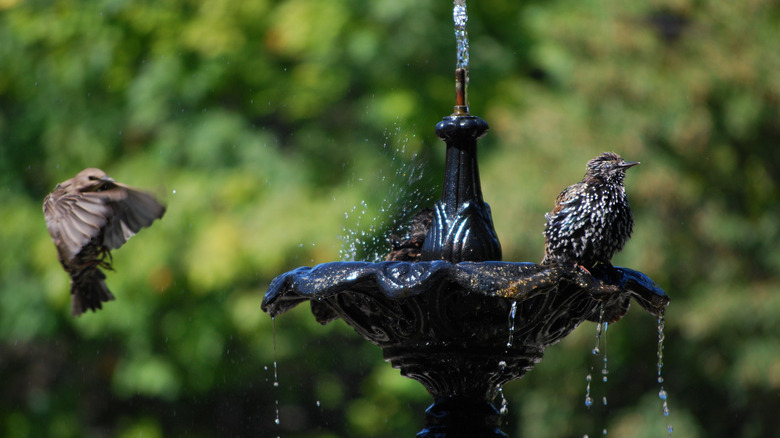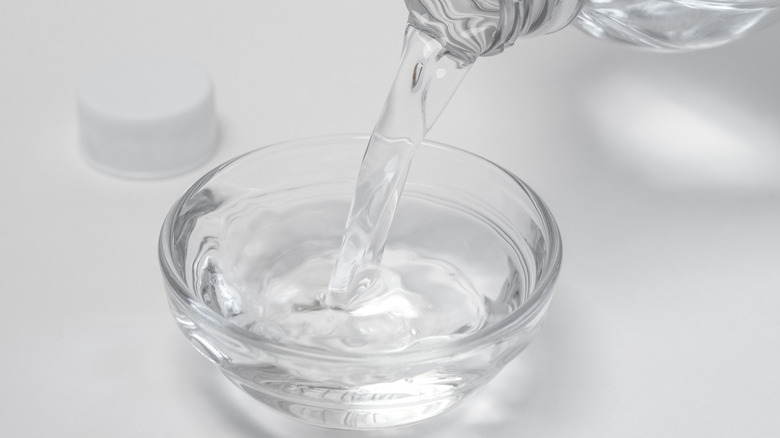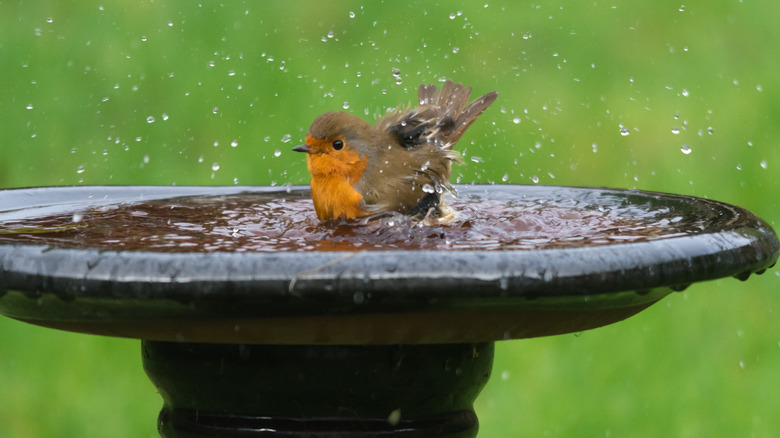How To Use Vinegar To Keep Your Birdbaths & Outdoor Fountains Looking Like New
A birdbath and outdoor fountain in your garden won't just enhance the charm of your garden but also attract avians and make for the ideal spot for them to quench their thirst and take a refreshing bath. However, bird droppings, debris, and algae can soon turn your pristine water features dirty, necessitating regular cleanup (once a week or more frequently depending on how dirty the features get) to ensure it's not harboring disease-causing bacteria. Luckily, you can use distilled white vinegar to clean your birdbath and outdoor fountain and keep them looking new.
While you can sink your hard-earned money in store-bought cleaners, they aren't a safe choice for the features and can leach the essential oils coating a bird's feathers. Further, accidental surface runoff will negatively impact soil health. That's not the end of your problems. According to Geoffrey LeBaron, the director of Audubon's Christmas Bird Count program, "If you don't take good care of your birdbath ... it'll get fetid. That's when mosquitoes might become a problem." So if you'd rather the birdbath and outdoor fountain look their best, visiting birds don't fall sick, and mosquitoes stay away from your abode, concoct a vinegar and water solution.
Prepare a vinegar and water solution
Begin by wearing a pair of water-resistant gloves. Next, remove leaves, twigs, and other debris from the basin before throwing away the old water. You can even use the water to irrigate your garden, but ensure you don't dump all of it in one spot — doing so might drown a plant, but it will also create a puddle the avians might mistake for their birdbath. After you're done, combine white distilled vinegar and water in a 1:9 ratio and pour the solution into a spray bottle.
Spritz the empty basin with the cleaning solution. Now, determine the material of your birdbath and choose a sponge (or old cloth) or plastic brush accordingly. For instance, if you've got a metal, glazed ceramic, or glass basin, you can go with a sponge to clean the delicate surface of algae, dirt, and bird droppings. On the other hand, if your birdbath is made up of porous materials like concrete, use a brush with plastic bristles to scrub the basin clean. If you haven't cleaned the bath in some time and it bears some incredibly stubborn marks, leave the sprayed-on solution undisturbed for at least 10 to 15 minutes and then scrub it. Once the water feature looks like new again, wash it with clean water to remove the residual cleaning solution and let it dry in the sun before filling it up again. You can follow a similar cleaning procedure for an outdoor fountain.
Maintaining the water features
If you can still spot unsightly stains after cleaning the birdbath and outdoor fountain with the vinegar and water solution, apply some baking soda on them directly and add some water to create a paste. Rub a stiff-bristled brush in circles to remove the stains. Follow this up by washing out the basin with clean water and letting it dry. Once dry, fill the birdbath with 2 inches of water to enable birds to drink deeply and preen comfortably. If possible, put the water features in the shade near a tree — that'll slow down evaporation, ensure the water is cool and refreshing for the birds, and prevent bacteria and fungi from multiplying rapidly.
However, don't place the birdbath or outdoor fountain directly under a shrub or branch, as that can result in the accumulation of debris. Replace the water every two to three days to keep it from becoming a breeding ground for mosquitoes. If you want a DIY hack to keep your birdbath clean, try putting a few copper pennies in the birdbath since copper is biostatic and will discourage the growth of toxic algae. Ensure you pick pennies from before 1982 since the ones from 1983 are made of zinc and just have a thin copper coating. You can also invest in a wildlife-safe enzyme and seal the basin with a clear, non-toxic sealer. Due to avian influenza among wild birds, if your goal is to sanitize rather than merely maintain your birdbath or fountain, experts recommend using a little bleach mixed with water to prevent the spread of disease.


